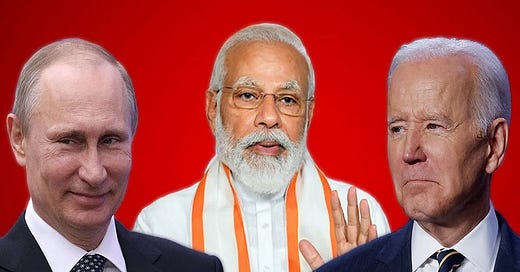Discreet Disagreements In Indian-Russian Ties Contrast With Public Ones In Indian-US Ties
Russia prefers to handle sensitive issues behind closed doors, especially with its partners, while the US instinctively seeks to publicly humiliate all those who dare to defy its hegemonic demands. For a rising and self-confident Great Power like India, it’s a no-brainer which of those two its diplomats would prefer to deal with.
Indian Ambassador to Russia Pavan Kapoor told Sputnik on Friday during the India Day Festival in Moscow that discretion is key to preserving the strength of these two Great Powers’ strategic ties. In his words, “We have a traditional relationship with this country and in any case with any issues with governments, we speak to them in private, we don’t believe in conveying our views in the open in the public. We have a belief in talking to people open and frankly, but not necessarily out in the public.” Being the world-class diplomat that he is, Ambassador Kapoor couldn’t state the obvious, but he was clearly implying a fundamental difference between India’s ties with Russia and the US.
No pair of countries ever completely sees eye-to-eye on everything, nor should they since doing so would suggest that one of them was obsequiously trying to appeal to the other at their possible expense of their own objective national interests. India and Russia are no exception. They previously had divergent views over Russia’s growing closeness to China since 2014, India’s growing closeness to the US during that same time, and the rapid Russian-Pakistani rapprochement that unfolded over the past half-decade before unexpectedly stalling after the US-orchestrated post-modern coup against former Prime Minister Imran Khan in early April.
Nevertheless, “The Twists & Turns Of Russian-Indian Relations Over The Past Few Years” were amicably addressed by the beginning of the present one after their representatives did exactly what Ambassador Kapoor said: they held open and frank discussions about their divergent views behind closed doors until they finally understood that no serious differences exist between them. To the contrary, they’re both pursuing the same outcome of enhancing their strategic autonomy in the New Cold War between the American and Chinese superpowers, albeit going about it in different ways. Upon realizing this, they right away began coordinating their multipolar grand strategies in Eurasia to facilitate their shared goals.
The end result was that India became Russia’s irreplaceable valve from Western pressure and thus preemptively averted Moscow’s potentially disproportionate dependence on China, which was a game changer that profoundly shaped the dynamics of the global systemic transition to multipolarity. Amidst all of this, however, the US publicly aired out its grievances against India in increasingly aggressive and rude aways. Delhi rebuffed every single one of Washington’s attempts to pressure it curtail ties with Moscow, but the US’ unilateral decision to provoke major drama over their differences on this sensitive issue left an extremely impression in the minds of Indian decisionmakers and strategists.
It suggested that America still arrogantly regards itself as “exceptional”, and in a racist way at that by presuming that Global South states like India will unquestionably capitulate to all of its hegemonic demands. Instead, “India’s Top Diplomat Reminded The West That The World Doesn’t Revolve Around It”, which dealt a crushing blow to the US’ soft power. External Affairs Minister Jaishankar is an committed believer in multipolarity who doesn’t let any US smears against his state go unanswered, which is why he was provoked to respond in the way that he did. That outcome was counterproductive from the perspective of American interests, though it has nobody to blame for this but itself.
Therein lies the fundamental diplomatic difference between Russia and the US, and not just regarding their respective ties with India, but their relations with other countries more broadly. Moscow prefers to handle sensitive issues behind closed doors, especially with its partners, while Washington instinctively seeks to publicly humiliate all those who dare to defy its hegemonic demands. For a rising and self-confident Great Power like India, it’s a no-brainer which of those two its diplomats would prefer to deal with since Russia truly respects their civilization-sate as an equal while the US mistreats it as a vassal.




